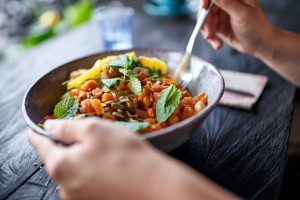 If you’re looking for an easy way to cut cholesterol and reduce your risk for heart disease, I have four words for you: plant sterols and stanols.
If you’re looking for an easy way to cut cholesterol and reduce your risk for heart disease, I have four words for you: plant sterols and stanols.
These compounds have unique cholesterol-lowering abilities and are found in a host of plant-based foods, including nuts, fruits, vegetables, grains, legumes, seeds, and more. They are even added to items like juice and margarine to make them a little healthier.
Advertisement
Plant sterols and stanols share a similar molecular structure to cholesterol, which helps trick your body during digestion. The sterols and stanols essentially block cholesterol absorption by taking the space it would typically occupy. Instead of being absorbed in the bloodstream, harmful LDL cholesterol is excreted from the body as waste.
The results can be rather profound, particularly for people with high cholesterol and an elevated heart disease risk.
One study, published in the New England Journal of Medicine, found that less than an ounce of stanol-fortified margarine per day can lower “bad” LDL by 14 percent.
Another study showed drinking orange juice fortified with plant sterols could reduce LDL by more than 12 percent.
What’s impressive is that those results used stanol-and sterol fortified foods that are not even “healthy.” Imagine what might happen if you were getting your plant sterols and stanols from healthful whole foods like nuts, fruits, vegetables, or whole grains?
If you drink a glass of orange juice per day or like to spread some margarine on your whole-grain toast, opt for sterol-or-stanol fortified foods to help you get a better handle on cholesterol.
Advertisement
Eating more whole plant-based foods can have further cholesterol-lowering abilities.
If you’re looking for ways to manage cholesterol, plant sterols and stanols could help you accomplish your goals. They may work alongside or as an alternative for cholesterol-lowering stain medications.
Talking to your doctor before deciding to increase stanol and sterol intake, particularly if you’re taking statins, is recommended before moving forward.
